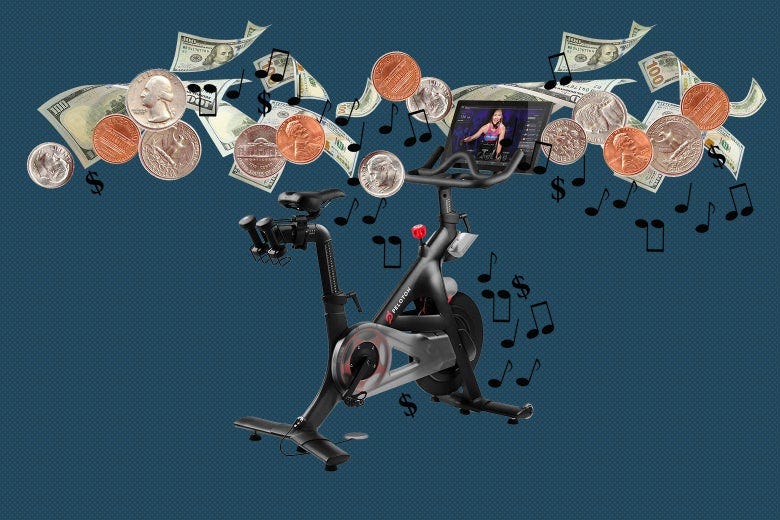💰Why Peloton pays Artists more than Spotify
American fitness company Peloton's unique model and use of music means that artists actually get paid more from it, than via streaming apps like Spotify
We write a weekly newsletter on all things Music, and the Business and Tech behind it. If you’d like to get it directly in your inbox, subscribe now!
Happy Monday everyone!
Earlier this month, American fitness company Peloton Interactive-announced a change of guard, with former Spotify and Netflix CFO Barry McCarthy taking charge as CEO from its founder John Foley.
What is Peloton exactly?
Founded back in 2012 by Foley- a former President of Barnes & Nobles- at its core, Peloton sells fitness bikes and treadmills that enables users to stream media on its equipment and get trained from instructors around the world, remotely 🚴🏻♀️
With the fitness bikes costing around $1500, and subscriptions for the instructor streaming services starting at $39/month, Peloton has a unique hardware/software combination that has managed to create a cult of die-hard fans especially in USA 🇺🇸
If you try and think of companies that have benefitted coming out of the pandemic in 2020, there aren’t many that can match Peloton’s meteoric growth 📈
With a 440% rise in stock price, and a valuation that peaked at around $50 Billion at the start of 2021, nothing seemed to be going wrong for the company whose bikes and remote fitness classes went viral as gyms and outdoor parks shut down because of Covid.
So despite clocking $4 Billion in revenue in 2021- a 120% increase over the previous year; why did Peloton have to replace their own founder as the CEO?
And what has all of this got to do with Music anyway? 🤔
Back in January this year, Peloton announced that it was halting all further manufacturing of its fitness bikes, owing to miscalculation of the demand it could generate in a post-covid world.
Over the past few months, almost $40 Billion has been wiped out from its market cap, with its share price back to the levels of where it was at the time of its IPO in 2019 📉
There are more nuanced reasons for the waning demand, but this prompted me to go down the rabbit hole of Peloton’s story, where I came across a shocking stat of how the music that plays on its fitness bikes, actually ends up paying artists more in royalties, when compared to streaming platforms like Spotify and Apple Music 💸
How exactly?
Unlike Spotify or the Radio, Peloton actually requires multiple licenses for the particular way that they use the music 📝
With respect to musical compositions, in addition to obtaining publishing rights, they generally need to obtain separate public performance rights.
To understand why, you have to understand the two different types of royalties offered through the vast digital music market ⏬
👉🏻 Mechanical Royalties
These royalties are paid upon the production or transaction of particular units of music, like vinyl or digital files or individual plays
👉🏻 Performance Royalties
These royalties are paid when music is performed in a live venue, either as part of a film or TV show’s soundtrack or streamed in some form of public setting.

By paying performance royalties for its song streams, Peloton considers itself to be a different type of music broadcaster, more like a radio than a record player 📻
Users may look for playlists and videos that feature a certain artist or a certain song, but both the entire experience of hearing the music and the playlist including that song are curated by the instructors—not by you.
So it’s more like listening to music in the gym over which you have no control, but rather than just 15-20 people humming along to their workout, Peloton remote classes have gone upto 23,000 riders in a live class at once 😳
And this is where things get tricky.
For years, Peloton used music without paying up their fair share of royalties according to the copyright laws, and songs from artists like Taylor Swift, Adele and Beyonce were used in its fitness classes.
Back in 2019, it was slapped with a $300M lawsuit by the National Music Publishers’ Association (NMPA), for use of music in it’s videos without paying out the sync license fees (typically paid out by Movies & TV Shows for use of music)
While that lawsuit has now been settled, Peloton pays out almost 1/3rd of its subscription fee that is collected from riders, towards the cost for the music that plays during the workouts 🤯
How insane is that?
When you play music from your smartphone via Spotify versus streaming music via your Peloton bike, the artist can receive almost 10x lesser royalties, just because of how the copyright laws are set up 🤷🏻♀️
If you’re interested in doing a deeper dive into the entire Peloton story, Ben and David from the Acquired Podcast recently did a deep-dive into this 🎙
Check it out right here ⏯
That’s it for today, let’s go get the bread this week 😤
If you liked this newsletter from Incentify, why not share it with someone you like?
P.S- Follow us on Instagram and Twitter for more such content on all things Music and Culture, now!






